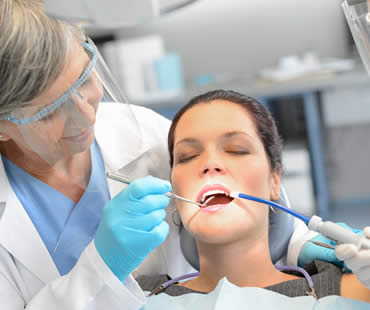
Sep 7, 2018
If you have severely damaged, diseased or injured teeth, your dentist may recommend crown and bridge treatment. A crown is a dental restoration that fully covers a tooth and becomes the tooth’s new outer surface. A bridge is also a dental restoration that is anchored to natural teeth. However, a bridge replaces and fills the gap left by multiple missing teeth. Both crowns and bridges are made from a variety of materials and can be matched to the color of your natural teeth. Unlike removable dental devices like dentures, crowns and bridges are permanently affixed to existing teeth or implants allowing them to look and function similarly to natural teeth.
In addition to restored function and appearance, crowns and bridges offer a host of additional benefits including:
- Dental crowns protect and strengthen the natural tooth, helping you to avoid extraction.
- Crowns are the final step in root canal treatment, protecting the tooth from bacteria that could re-infect the treated tooth.
- Crowns and bridges restore missing teeth and support the remaining teeth.
- Your natural bite is restored and maintained with crown and bridge treatment.
- Placement of crowns and bridges improve your speech, smile and chewing function.
- Adjacent teeth are prevented from shifting and tilting with crown and bridge treatment.
- Crowns and bridges are long-lasting, predictable and durable.
- Placement of crowns and bridges is quick and can usually be completed in as little as two appointments.
- Alternatives to crown and bridgework, like dental implants, are usually more invasive requiring surgery and possibly bone grafting to place the implant.
Consult with your dentist to find out more about the advantages of crowns and bridges and how they can help to restore your healthy smile.
We look forward to seeing you in our Fall River dental office

Aug 31, 2018
Giving some form of a sedative medication to patients during dental treatment is what sedation dentistry is all about. It causes relaxation and decreases anxiety so that the patient is comfortable and the dentist can work safely and efficiently. Sedation dentistry is most popular for those who experience mild to moderate dental anxiety, patients who have dental phobias, and children who are frightened by dental visits.
There are a number of advantages that sedation dentistry offers to both patients and dentists. Here are some reasons that it is popular with patients:
- Pain is diminished so that the patient hardly feels the instruments, needles, or anything else as part of the treatment.
- Awareness is reduced so that that patient doesn’t realize exactly what is happening and doesn’t keep track of the time spent in the dental chair.
- Anxiety is lessened so the patient feels calm and carefree while undergoing treatment that normally might cause upset.
- Side effects are minimal and rare, making sedation dentistry both safe and effective.
- The gag reflex is reduced so patients who might normally have problems gagging during treatment are able to undergo procedures without issues.
- Time is saved for the patient because often all treatments can be performed in one office visit, instead of having to make several trips and miss more time from work or other activities.
Dentists enjoy benefits of sedation dentistry as well:
- Patients are more cooperative and able to sit still during treatment, allowing dentists to get the job done with less trouble.
- Multiple procedures can be done in a single office visit, so the dentist can accomplish more in a single time slot.
- Reflexes of the patient are more controlled so that movement is less haphazard and the dentist can work more efficiently.
We look forward to seeing you in our Fall River dental office

Aug 24, 2018
Your teeth and gums are physical assets that you want to keep healthy your whole life, and the best way to do that is to take care of them. Proper dental care needs to begin at a young age so that good habits are established for life. It is a parent’s role to teach children proper hygiene, and to ensure they get professional treatment. Here are some ways that you can help your child learn good dental habits.
Supervise brushing:
Parents should watch children brush their teeth, especially for ages seven and under, to ensure the appropriate amount of toothpaste is used and that none is swallowed. Have your child brush for about two minutes, and make sure all areas of the teeth and gums are cleaned. Provide tips and help as needed.
Establish good eating habits:
Teach your child that diet impacts oral health. Some foods worsen plaque buildup and introduce damaging acid into the mouth, leading to increased tooth decay and higher risk for cavities and gum disease. Certain foods and drinks are also known to stain teeth, or cause bad breath.
Promote water consumption:
Drinking water not only is good for your overall health, it’s also helpful to your mouth. Encourage your child to drink water after eating, especially if it’s not possible to brush teeth right away. Also, fluoridated water is proven to help fight cavities.
Visit the dentist:
Begin taking your child to the dentist around age one, so that the child gets good dental care and learns that dental visits aren’t scary. Have a positive attitude about checkups, and consider taking your child to a pediatric dentist who specializes in children’s oral health.
Be a role model:
As the saying goes, practice what you preach. Set a good example of brushing at least twice daily, flossing every day, limiting your intake of staining foods and drinks, and visiting your dentist regularly.
Our dental office is located in Fall River

Aug 17, 2018
Whether you are a teenager or an adult, you may have pain associated with your wisdom teeth. In a perfect situation, these back molars erupt last and fit right into your mouth without problems. Many people are not so lucky, however. It is common for these teeth to attempt to come in, but have nowhere to grow in the space where your other teeth are already established. This can result in a very painful toothache.
The first step you should take is visiting your dentist, where x-rays will be taken to see exactly what is happening in your mouth. The x-rays will be examined to determine the angle the teeth are growing, how much room is available for them to develop, and if there is any infection present. Depending upon the examination results, surgery may be necessary to remove your wisdom teeth.
Your dentist will look for signs that indicate your wisdom teeth need to be removed. The main indications for tooth removal include:
- A tooth embedded in your gums
- A tooth that is only partially erupted
- The presence of a cyst around the tooth
- A tooth growing in an awkward angle
If your dentist recommends removal, it is usually suggested to have it done as soon as possible to avoid further problems and continued pain. Sometimes it is necessary to remove only a single tooth, and in other cases multiple teeth may need to go. The complexity of the removal depends on whether the teeth are embedded, the angle of growth, and other issues. Your dentist will advise you on the safest and most effective plan for taking care of your wisdom teeth and getting rid of the pain.
If you live in the Fall River area contact us today

Aug 10, 2018
Broken, chipped, stained, or crooked teeth can ruin an otherwise nice smile. Minor flaws like these can be easily corrected with dental veneers. They are a popular way to whiten, straighten, and improve smiles to get long-lasting and natural-looking results. Here are some reasons that veneers are chosen by many people wanting to change their look.
Better smile
Veneers are thin porcelain shells customized to fit securely onto the front surfaces of your teeth. They hide problems and fit in beautifully with the rest of your features. Your smile will be made brand new.
No more stains
Yellow or stained teeth can really make a smile look unattractive. Some discolorations are very hard to get rid of, even with professional cleanings or whitening. Veneers instantly brighten your smile to the shade of your choice, and resist stains so that you no longer have to worry about the foods and drinks you consume.
Straighter teeth
If your teeth alignment problems aren’t major and you don’t want to go to the hassles or expense of braces, veneers may be a solution. They go right over crooked teeth to create a straight smile.
Quick results
Veneers can be provided in just a couple of office visits. You will have a short time between getting temporary and permanent veneers attached, but once they are in you’ll immediately have an improved smile.
Long lasting
Veneers can last a lifetime if you take proper care of them. Regular brushing, flossing, and checkups will help ensure a sparkling smile for many years to come.
Few risks
Side effects with veneers are nearly non-existent. There may be some initial discomfort, but it subsides quickly and can be treated with over-the-counter medications. The only thing to remember is that veneers are permanent. Since a small amount of tooth enamel is removed to accommodate the veneers, you’ll have them forever or will need to get replacements at some point.
Cosmetic dentist in Fall River

Aug 3, 2018
Whitening your teeth to improve your smile is a popular cosmetic treatment, but you should understand that it does have some limitations to consider. If products are used correctly or if you seek the professional help from a qualified dentist, you can usually achieve a bright and appealing smile. Here are some things to think about when it comes to teeth whitening.
Methods:
You should not expect over-the-counter methods to whiten your teeth more than a couple of shades. The whitening ingredients available in products at your drugstore are not as strong as those used at your dentist’s office. Consistent and correct use of over-the-counter options can help whiten your teeth, but it may not be as much as some patients hope will occur. On the other hand, professional methods can produce dramatic and quick improvements to the color of your teeth.
Habits:
Certain habits contribute to stains on your teeth and if you don’t limit or stop activities prone to discoloring teeth, your newly whitened teeth may become discolored again. Foods like berries and curry, drinks such as coffee and red wine, and habits like smoking will all likely negatively affect your tooth color.
Restorations:
Bridges, crowns, and laminates might not respond in the same way to whitening agents as your natural teeth do. Ask your dentist about how your restorations might react to teeth whitening.
Side effects:
Tooth sensitivity is the most common side effect of whitening procedures, causing some patients to be unable to handle some methods of treatment. Gum sensitivity is another potential problem, but usually dissipates soon after the whitening procedure. Weakening of a restoration may also occur during whitening treatment, sometimes making it necessary to replace them.
Expectations:
Teeth whitening must be occasionally repeated if you want your bright smile to remain for a lifetime. The effects do not last indefinitely, because aging and activities can stain your teeth. Excessive bleaching may damage your teeth though, so be sure to discuss your whitening treatment with your dentist.
Schedule your appointment at our Fall River dental office

Jul 27, 2018
Are you missing one or more teeth? Dental implants are among the best possible solutions for patients missing teeth. Dental bridges and dentures can fill the gaps left by acute decay or gingivitis, but dental implants have many advantages over these other techniques.
Dental implants are typically made of titanium and serve as an artificial root for a missing tooth. They are fused directly to the jawbone and become an excellent foundation for replacement teeth. They are the best possible substitute for a natural tooth that a dentist can provide.
Dental implant therapy has several benefits, among them:
- Dental implants are very convenient. Bridges necessitate cleaning carefully under and surrounding the bridged tooth, and dentures need to be removed and specially cleaned and can utilize messy adhesives to affix them to your mouth. Dental implants are cleaned exactly as you would clean your natural tooth. Brush and floss normally. There is no slippage or cleaning beneath or between the replacement tooth, which is permanently attached to the gum via the dental implant, which fuses to the bone in a process known as ossification.
- Dental implants look better than other replacement teeth. They are intended to appear and function as your natural tooth would.
- Because they’re fused to your bone, they are more secure than dentures or bridges that can slip in the oral cavity, causing pain, muddled speech and problems eating or drinking. Dental implants are incapable of slippage, leaving you to lead your life with confidence and security.
- Dental implants preserve bone by stimulating the bone in your jaw, something necessary for the health of the bone. Without this stimulation, the bone can begin to shrink.
- Dental implants are very durable and can last for decades, if not for a lifetime, when cared for properly.
- Because dental implants don’t require any alterations to the surrounding teeth, those natural teeth are able to remain intact, lending to your overall good oral health.
We look forward to seeing you in our Fall River dental office

Jul 20, 2018
Denture technology has come a long way since the days of George Washington and his wooden teeth. Unfortunately, people still lose teeth for a variety of reasons including periodontal disease, trauma, and decay. Missing teeth make talking and eating difficult, and can ultimately cause sagging facial muscles. However, with today’s advances in technology it is more possible than ever to replace those lost teeth with natural and comfortable dentures.
Complete dentures cover both upper and lower jaws. The options for complete dentures range from immediate dentures to highly customized implant dentures. Immediate dentures are pre-made and available at your dentist’s office. They are not custom fitted and are set into gum sockets immediately upon removal of your teeth. While these offer the convenience of walking immediately out of the dental office with your new teeth in place, once gum tissue heals and swelling reduces they may shift and become loose. This issue requires follow-up visits for your dentist to make adjustments. People with immediate dentures may also have difficulty speaking, or experience a “clicking sound” when talking.
Conventional full dentures can be made 8 to 12 weeks after tooth loss or removal. Once the gums have healed, your dentist takes a series of impressions of your mouth to be sent away to a dental lab to create your dentures. This process may require multiple visits to your dentist to ensure a proper fit and correct bite. While this process takes longer and is more involved than immediate dentures, you will achieve a more secure and personalized fit. Both conventional and immediate dentures require the use of denture adhesives to keep them securely in place.
For an even more custom, natural looking and secure denture option, implant dentures are an excellent alternative. With implant dentures, small implants are placed in the jaw where they heal in place surrounded by the bone. The denture then snaps into the implant with attachments under the denture. These attachments keep the denture stable, providing more comfort and confidence. You do not have to worry your dentures will slip or fall out while you are eating, talking, or laughing. Implant dentures do not require the use of any denture adhesives.
Talk to your dental professional to determine the best use of denture technology to ensure many years of a confident and comfortable smile.
Our dental office is located in Fall River

Jul 13, 2018
It may be obvious when you’re in a situation that requires immediate treatment by a dentist. Perhaps you’re in immense pain, or you’ve had a tooth knocked out or bleeding that won’t stop. Examples like this make it easy to decide you need help right away, but sometimes it’s not as clear. What are some other problems that may require emergency dental treatment?
Cracked teeth
A cracked or fractured tooth is serious, and often means that the tooth has been damaged both on the inside and the outside. Many times the tooth can’t be saved. If your tooth is broken, schedule an emergency appointment immediately. Remember, a cracked tooth is different than a chipped tooth, which is not as serious. You can usually wait to see your dentist at the next available opportunity for a chipped tooth.
Lost fillings
Some lost fillings require immediate care to avoid worse issues. Fillings protect your tooth’s root from exposure, so if the filling falls out your root can be uncovered and cause intense pain. There is also increased risk for damage to your tooth’s structure, so seeing your dentist as soon as possible is suggested.
Lost crown
If your crown falls out, call your dentist for an appointment as soon as possible. Until you can see the dentist, try putting the crown back in place using an over-the-counter dental adhesive. Do not use any products like Super Glue. If the crown won’t stay in place, make sure you take it to your appointment with you so that it can be re-cemented correctly.
Abscess
If you have a painful swelling on your gum that resembles a pimple, it might be a serious condition called an abscess. It can damage gum tissue and teeth, as well as spread serious infection to your body. See your dentist immediately for proper treatment.
Emergency dentist in Fall River – Dentistry in the Highlands

Jul 6, 2018
Your body is a little bit like a puzzle. It gives you clues to help you figure out what’s going on within your body. Did you know your mouth can give you hints about things that may be happening elsewhere in your body? Here’s a list of some of the signs your mouth can give you to pay attention to certain other aspects of your health.
Worn teeth and headache
If your teeth are showing extensive wear, you may be grinding your teeth. This would be even a stronger possibility if you’re also experiencing regular headaches, which can be caused by the muscle tension related to teeth grinding. This condition also indicates that you are likely under too much stress, and that you are unconsciously coping with it by grinding your teeth.
Gums covering teeth
If your gums begin to grow over your teeth and you are on medication, it may mean that your medication is at fault. Some medicines can cause your gums to overgrow, and the dosage needs to be adjusted.
Mouth sores
An open sore in your mouth that doesn’t go away in a couple of weeks can be an indicator of oral cancer. Numbness and unexplained bleeding in your mouth are other signs. Smokers and people over age 60 are at the most risk, but that doesn’t mean it doesn’t affect others too. See your dentist to make sure all is okay.
Cracked teeth
If your teeth begin to crack or wear extensively, you may have gastroesophogeal reflux disease (GERD). It’s a digestive disease that allows stomach acid to flow back into your food pipe and mouth. This acid can cause your teeth to deteriorate. Additional signs of GERD are acid reflux, heartburn, and dry mouth.
Unclean dentures
If you wear dentures, make sure you remove and clean them regularly. Inhaling food debris from your dentures that makes its way to your lungs can lead to pneum










